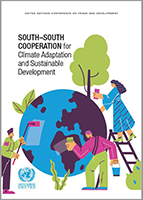The world is experiencing a dangerous change in the climate. According to the latest report from IPCC2, in the last four decades, each decade has been successively warmer than preceding decades since 1850. This global heating is reducing the snow cover and sea ice in some regions and intensifying heavy rains and forest fires in others, leading to drastic changes in the existing habitat.
This paper examines the impact of climate change on developing countries and provides the ways in which South-South cooperation can help developing countries in building climate resilience and meeting the climate adaptation goals set in their NDCs.
The paper proposes building capacity of developing and least developed countries by sharing experiences on green industrial policies and proposes a positive trade and environment agenda at the WTO to secure an enabling multilateral environment for developing countries to adapt to climate changes while pursuing their sustainable development goals.
The paper shares selected successful examples of cooperation for climate mitigation and adaptation amongst the developed countries which can provide valuable lessons for the South.
Based on these insights, the paper proposes four mutually reinforcing core principles for a South-South Cooperation framework for climate adaptation and presents a complementary south-south cooperation agenda for climate action.
It also underscores the importance of comprehensive and coordinated regional climate adaptation strategies and emphasises the need to set up an inter-regional Secretariat within the UN system with the mandate of boosting South-South cooperation on climate adaptation and sustainable development.
To discuss and address the fast-advancing climate challenges for developing countries, organising an annual Ministerial Forum on South-South Cooperation on Climate Adaptation is suggested which can work on the continuously evolving climate adaptation agenda for the South.
The paper was developed under the UNCTAD project entitled “Integrated Policy Strategies and Regional Policy Coordination for Resilient, Green and Transformative Development: Supporting Selected Asian BRI Partner Countries to Achieve 2030 Sustainable Development Agenda”, funded by the United Nations Peace and Development Fund (UNPDF) through its sub-fund for the 2030 Agenda for Sustainable Development.


